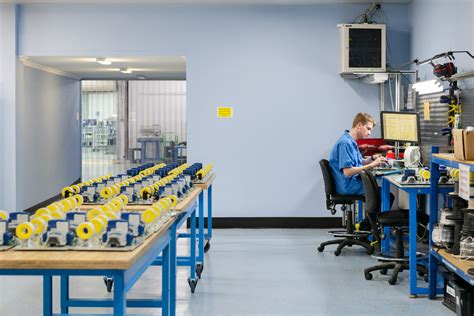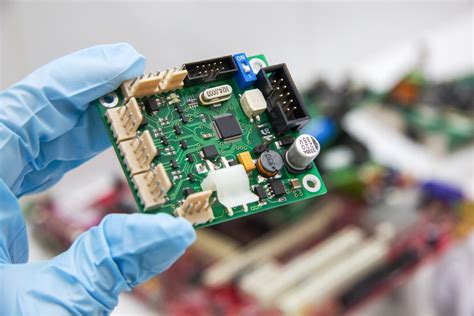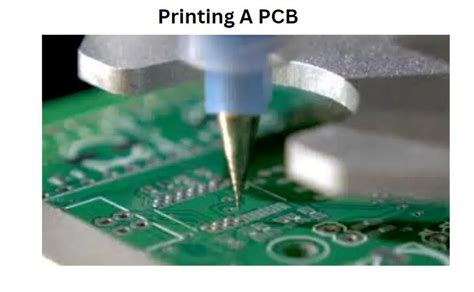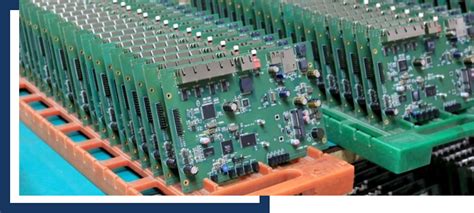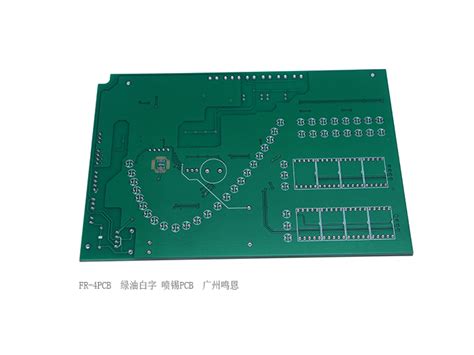Unlocking Potential: The Rise of Contract Manufacturing in Electronics
Key Takeaways
The rise of contract manufacturing in electronics has noticeably transformed the industry, particularly in the realm of electronic assembly. This shift allows companies to streamline their production processes and focus on core competencies while outsourcing the complexities involved in manufacturing. Contract manufacturers, specifically those specializing in pcb assembly, have become invaluable partners, providing expertise and scalability. PCBA, or Printed Circuit Board Assembly, has emerged as a critical area where these manufacturers can deliver significant advantages, such as shorter lead times and improved product quality. By collaborating with contract manufacturers, businesses are not only able to reduce costs but also enhance their operational efficiency. This partnership encourages innovation, as companies can allocate more resources toward research and development rather than labor-intensive production processes. Ultimately, the strategic alignment with contract manufacturers is essential for electronic companies aiming to thrive in a highly competitive marketplace while adapting to ever-evolving technological advancements.
Understanding Contract Manufacturing: A Key Player in Electronics
Contract manufacturing has emerged as a pivotal element in the electronics ecosystem, significantly influencing how products are developed and brought to market. At the heart of this evolution is electronic assembly, which includes essential processes such as PCB assembly and PCBA (Printed Circuit Board Assembly). These services allow companies to focus on their core competencies while outsourcing the intricate and often resource-intensive tasks of manufacturing and assembly.
The ability to leverage specialized suppliers not only enhances efficiency but also accelerates time-to-market for innovative products. In this competitive landscape, businesses can capitalize on their expertise in design and marketing, while trusting contract manufacturers to deliver high-quality electronic assemblies. This symbiotic relationship fosters an environment ripe for innovation, as companies collaborate with contract manufacturers who possess cutting-edge technology and skilled labor.
“Outsourcing non-core activities can significantly free up resources and drive innovation.”
Implementing contract manufacturing strategies is essential for electronics firms looking to reduce operational costs without sacrificing quality. A well-structured partnership allows for smoother operations, reduced lead times, and increased flexibility in meeting market demands. As the industry continues to evolve, understanding these dynamics will be crucial for any company aiming to stay competitive in the fast-paced world of electronics.
Overall, contract manufacturing stands out as a key player, empowering businesses to modernize their approach to production while remaining focused on strategic priorities.
The Evolution of Electronic Assembly in Contract Manufacturing
The landscape of contract manufacturing has undergone a significant transformation, particularly in the realm of electronic assembly. As companies strive to remain competitive, they increasingly turn to specialized manufacturers for their PCB assembly needs. This shift has been largely driven by the rapid pace of technological advancements and the necessity for increased efficiency and innovation.
Historically, electronic assembly was conducted in-house, limiting companies’ ability to respond swiftly to market demands. However, as global competition intensified, the need for enhanced operational flexibility became paramount. Contract manufacturing of electronic assemblies, including PCBA (Printed Circuit Board Assembly), offers a strategic solution. By outsourcing this critical component of production, businesses can harness the expertise and resources of specialized firms that focus exclusively on pcb assembly processes.
Furthermore, this evolution not only streamlines production but also significantly reduces costs associated with labor and materials. Companies can eliminate overhead costs related to maintaining an in-house manufacturing facility while benefiting from economies of scale achieved by leveraging the capacity of contract manufacturers. This method allows organizations to redirect their resources toward core competencies such as research and development or marketing.
To illustrate these benefits, Table 1 outlines some key advantages associated with adopting contract manufacturing for electronic assembly:
| Advantages | Description |
|---|---|
| Cost Efficiency | Reduction in operational costs by eliminating the need for extensive manufacturing infrastructure. |
| Expertise Access | Leverage specialized knowledge in PCB design and production techniques from experienced manufacturers. |
| Scalability | Easily adjust production volume based on market demand without incurring significant capital expenses. |
| Focus on Core Competencies | Enables businesses to concentrate on innovation and strategic initiatives rather than mundane processes. |
In conclusion, the evolution towards contract manufacturing for electronic assembly represents a pivotal shift that aligns with broader trends in globalization and technological advancement. As companies adapt to these changes, they position themselves not only to survive but thrive within an increasingly dynamic industry landscape.
Benefits of Contract Manufacturing for Electronic Companies
The rise of contract manufacturing in the electronics sector offers a multitude of benefits for businesses navigating today’s competitive landscape. By focusing on pcb assembly and related processes, companies can significantly reduce operational costs. One of the primary advantages is the ability to leverage specialized expertise that contract manufacturers bring to the table, particularly in areas such as pcba (printed circuit board assembly). These manufacturers often possess state-of-the-art technology and skilled personnel that smaller firms might find financially burdensome to maintain in-house. Consequently, this enables companies to focus on their core competencies, such as design and marketing, while outsourcing complex manufacturing tasks.
Additionally, the agility offered by contract manufacturers allows electronic companies to scale production swiftly according to market demand. This is particularly advantageous in industries marked by rapid technological advancements and fluctuating consumer preferences. Cost-efficient production methods fostered by contract manufacturing also pave the way for innovation; organizations can allocate resources towards research and development when they aren’t overextended with manufacturing responsibilities. Furthermore, establishing strong partnerships with reliable contract manufacturers can lead to improved supply chain management, ensuring quality control while minimizing lead times. As a result, businesses that engage in contract manufacturing not only enhance their efficiency but also position themselves strategically for future growth through innovation and reduced overhead expenses.
Cost Reduction Strategies through Contract Manufacturing
In the rapidly evolving landscape of electronics, contract manufacturing has emerged as a pivotal strategy for companies looking to achieve substantial cost savings. One of the most significant areas where businesses have harnessed the power of contract manufacturing is in pcb assembly and its related processes, such as pcba. By outsourcing these specialized tasks to experienced contract manufacturers, companies can leverage economies of scale that would be difficult to achieve in-house. This approach allows organizations to minimize labor costs and avoid the expense of maintaining state-of-the-art production facilities. Furthermore, with contract manufacturers often possessing advanced technology and expertise in electronic assembly, businesses benefit from enhanced production efficiency, which translates directly into lower operational costs. The strategic partnerships formed through these arrangements enable firms to focus their resources on core competencies while trusting experts to handle intricate assembly tasks. As a result, businesses are not only reducing costs but also speeding up time-to-market for their products—a critical factor in staying competitive in today’s dynamic electronics sector. By implementing effective cost reduction strategies through contract manufacturing, organizations can position themselves for sustainable growth and innovation, vital for thriving amidst challenges in this industry.
Enhancing Efficiency: How Electronic Assembly Transforms Production
The rise of contract manufacturing in the electronics sector, particularly through electronic assembly, has significantly optimized production processes across various industries. By outsourcing tasks such as PCB assembly or PCBA, companies can focus on their core competencies while tapping into the advanced expertise and technologies offered by specialized manufacturers. This collaborative approach enhances overall production efficiency, allowing for quicker turnaround times and greater flexibility in scaling operations. Moreover, employing contract manufacturers enables businesses to streamline supply chains, resulting in reduced lead times and improved inventory management. The integration of advanced automation technologies within electronic assembly processes leads to higher precision, minimizing errors and maximizing output quality. Ultimately, as organizations leverage these benefits, they position themselves to respond more effectively to market demands while fostering an innovative environment that prioritizes technological advancements and cost efficiency.
Innovation through Collaboration: The Role of Contract Manufacturers
In the highly competitive electronics sector, the role of contract manufacturers has become increasingly significant, especially in the pcb assembly domain. These specialized companies provide invaluable support to original equipment manufacturers (OEMs) by offering advanced pcba solutions that embrace state-of-the-art technologies and methodologies. Through strategic collaboration, businesses can tap into the extensive expertise and resources that contract manufacturers bring to the table, allowing them to innovate rapidly while maintaining quality. The synergy between OEMs and contract manufacturers not only streamlines the production process but also allows for faster time-to-market for new products, which is crucial in today’s fast-paced environment. By leveraging the skillset of contract manufacturers, companies can focus on their core competencies while outsourcing complex tasks such as electronic assembly and quality assurance processes. This collaboration enables a more flexible approach to production that can adapt to changing market demands and customer preferences effectively. As innovation continues to drive progress within the electronics industry, the partnership with contract manufacturers is poised to play a crucial role in shaping future advancements in technology and product development.
Case Studies: Successful Implementations of Contract Manufacturing in Electronics
In recent years, numerous companies have successfully harnessed the power of contract manufacturing to streamline their electronic assembly processes, particularly through PCB assembly and PCBA services. For example, a leading smartphone manufacturer partnered with a contract manufacturer to optimize its production line. By outsourcing its PCB assembly, the company enhanced its supply chain flexibility and reduced production costs, leading to quicker time-to-market for new models. Another noteworthy case involved a medical device company that utilized contract manufacturing for its complex electronic assemblies. By leveraging specialized expertise in PCBA, they achieved higher precision and reliability in their products, ultimately improving patient outcomes. Through these examples, it’s clear that businesses that adopt contract manufacturing strategies not only benefit from reduced overhead but also gain access to advanced technologies and innovations that drive competitive advantage in an ever-evolving marketplace. As such, the role of contract manufacturers continues to grow in importance, enabling electronics companies to focus on their core competencies while navigating the complexities of development and production.
Future Trends in Contract Manufacturing and Electronic Assembly
As the landscape of technology continues to evolve, the contract manufacturing sector, particularly in electronic assembly, is positioned for significant transformation. One of the foremost trends is the increasing demand for precision in pcb assembly processes, driven by the growing complexity of electronic devices. As industries seek higher performance, manufacturers are adopting advanced automation technologies and robotics to enhance efficiency and accuracy in their operations. The integration of Artificial Intelligence (AI) into pcba processes is also gaining traction, facilitating predictive maintenance and real-time quality control. Furthermore, sustainability practices are becoming a priority; companies are looking to minimize waste and energy consumption during manufacturing. This shift not only appeals to environmentally conscious consumers but also aligns with global sustainability goals. The rise of modular electronics presents another trend where contract manufacturers are adapting their capabilities to accommodate more flexible design requirements, allowing for rapid prototyping and shorter time-to-market for innovative products. Overall, these trends indicate that contract manufacturers will play an increasingly vital role in shaping the future of electronic assembly, ensuring that businesses remain competitive while fostering innovation across various sectors.
Conclusion
The landscape of contract manufacturing in electronics has experienced significant evolution, particularly in the realm of electronic assembly. This has proven to be a game changer, enabling companies to streamline their operations and focus on core competencies. The integration of advanced technologies in pcb assembly and pcba processes illustrates how contract manufacturers can significantly enhance production efficiency. By outsourcing these tasks, businesses can not only reduce operational costs but also allocate resources toward innovation and product development. Furthermore, the collaboration between original equipment manufacturers (OEMs) and contract manufacturers fosters an environment ripe for creative solutions and advanced design enhancements. As the demand for customized electronics continues to rise, this symbiotic relationship is expected to play a pivotal role in shaping the future of the electronics industry. Ultimately, leveraging contract manufacturing services can unlock new potentials, allowing companies to thrive in a competitive market while constantly pushing the boundaries of what is possible in electronic assembly.
FAQs
What is contract manufacturing in electronics?
Contract manufacturing in electronics refers to the outsourcing of the manufacturing process to specialized companies that handle the production of electronic components and assemblies. These companies often provide pcb assembly services, allowing businesses to focus on design and innovation.
What is electronic assembly?
Electronic assembly pertains to the process of integrating various electronic components into a functional unit. This may include tasks such as soldering, pcba (printed circuit board assembly), and testing, ensuring that the product operates as intended.
How can businesses benefit from contract manufacturing?
Businesses can enhance efficiency and reduce operational costs by leveraging contract manufacturers. This allows them access to advanced technologies and expertise without bearing significant capital expenses associated with in-house production.
What are some common cost reduction strategies in contract manufacturing?
Cost reduction strategies may involve bulk purchasing of components through contract manufacturers or optimizing the production process for speed and efficiency. Companies can also benefit from economies of scale offered by established manufacturers skilled in pcb assembly.
How does electronic assembly transform production efficiency?
By streamlining the manufacturing process, electronic assembly improves turnaround times while ensuring higher quality outputs. This allows companies to bring products to market faster, thereby gaining a competitive edge.
Discover More about PCB Assembly
For more information on contract manufacturing and pcb assembly, please click here.

